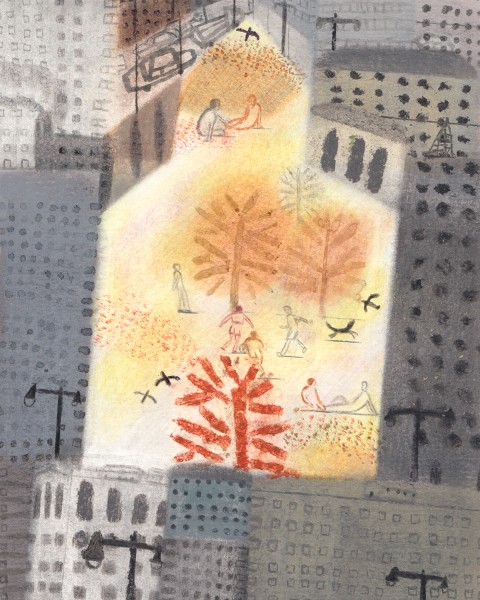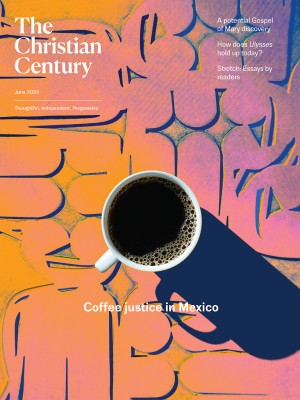What’s special about a church building?
How many buildings do we pass by in our daily lives where we could simply walk in, sit down, and participate?

(Illustration by Laura Carlin)
I’ve walked in and out church doors for so long I had forgotten. The strangeness of a building, a gathering, an hour or two or three on a Sunday morning where you, me, anyone can simply walk in and sit and listen, maybe meet someone new. No ticket required. No purchase of a pint or coffee or burger and fries in order to stay. You don’t need a bike. You don’t need to know how to sew or sing to be a part of this living thing that comes into being every week.
You could go to a park or free museum, sure. But that’s a different kind of public space, isn’t it? We’re occupying the same general space. We might be in proximity to other people, but people come and go; you could go there the same time every week and never see the same person. Or maybe by chance I walk my dog at the same time that you walk your dog and we exchange polite eye contact or friendly banter, share the names of our dogs (but not our own names), say hello and goodbye and that’s enough.
Read our latest issue or browse back issues.
How many buildings or events do we pass by in our daily lives where we could simply stop, walk in, sit down, and participate—and this is what is actually expected, even hoped for? Imagine seeing a band playing in the park, and as I walk by I unpack my ukulele and simply start strumming along.
After cycling for the last six or seven years and enjoying the peace of solo rides, I had a strange desire to share in this love with other cyclists. I’m a little shy and anxious about meeting new people, so a friend invited me to a social ride that meets every Tuesday evening. I rolled up and sheepishly said, “Hello, my name is Brian.” They were incredibly friendly and welcoming. But it was also so clear I was new, that so many of these folks had history with each other. I’m sure the more I go, the more I will see what we have in common. I may get to know the names of their kids or even if they have a rough time in their job. But that space isn’t really designed for more than enjoying each other and an activity we all love.
But the church is (could be?) different.
How many places exist in our world anymore that aren’t tied up with subscriptions, tickets, memberships, or the IYKYK that only shows up on my social media feed after the fact, leaving those of us on the outside wondering how people find out about such cool things?
How many buildings exist in virtually every neighborhood, every city and town, as little nooks of possibility, of sanctuary—where one can walk in and be reminded, “You are loved. You are good.”
How many spaces exist where you come to visit, visit again, and after weeks, months, years you realize you’ve transformed from stranger to kin, from guest to host, from the one receiving reminders to the one offering them?
It’s been so long since I’ve walked in and out of these doors that I’d forgotten what it meant to be a visitor, to be a person with such yearning that I risked walking into a foreign land full of strangers looking for something, for someone. It’s been so long that I forget that I’m still that person looking, hoping, stretching for a small reminder that God loves, that God is somehow present, that I’m not alone in this world. And I too often forget that I’m the face the stranger sees on those mornings when there are people who risked something to walk through those doors and that God may actually speak through my “Hello, my name is Brian. What’s yours?”
But I suppose it’s also true that too many of our churches are not this kind of public space. They have their own entry fees, implicit subscriptions, and terms to keep a membership in good standing. We keep tabs without realizing, we close doors in our silence or lose sight of each other in the clutter of our own lives we bring with us.
Amid all of our collective hand-wringing about the future of the church, I wonder what our church buildings might become if we saw them as public spaces, more like parks than sanctums. If we appreciated the radical interruption of a place where anyone can come, sit, sing, be welcomed and invited to simply be, where each week we are hosting and being hosted, where all can be nourished.
And as with a park, the welcome is not just keeping the gates open but also the tending we collectively have to commit to, remembering that this little patch of land doesn’t belong to us or exist for us. It’s where we’re allowed to tend, a point in time and space where our participation with God’s work in the world condenses, where bodies and souls gather into rich gray clouds just waiting to return what has been gathered.
In the end, we may have rich theologies of the church, but part of our uniqueness may have more to do with the ways we recognize just how unusual our gathering is in our community—and what that gathering might offer those who stumble in.







